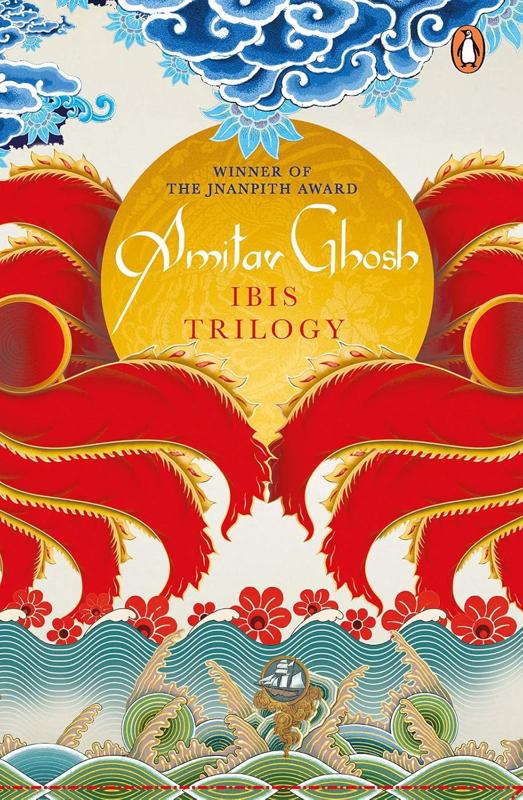
Ever since I read An Era of Darkness by Shashi Tharoor, I have been yearning to read more colonial history. Europeans looted continents and brutalized, enslaved or decimated the native populations. They were efficient and successful conquerors, able to convincingly justify their tyranny, racism and insatiable greed as a struggle for freedom, justice and benevolence, to all including themselves.
Tharoor’s factual and focused account of British perfidy and cruelty in India leaves the reader thirsting for a more detailed panoramic picture of their policies, attitudes and trading practices. Yet, most colonial history written from a European perspective does not satisfy. Besides, historical facts and analysis are often devoid of the human emotion and the drama that enfolds when individual lives are drastically transformed by regime changes. That is where the Ibis Trilogy by Amitav Ghosh can be quite satisfying.
Book Details
Genre: Historical Fiction, Colonialism, War
Ages: 13+
Publisher: Penguin
Price: Rs 628.94 for the ebook and Rs 1009.00 for the paperback.
Buy From amazon India
Buy From amazon USA
Plot Synopsis
Set in a historically accurate backdrop, the Ibis Trilogy examines the interactions and perspectives of a diverse group of individuals whose fates are intertwined by their co-operation in a secret act of defiance.
The series commencing in the opium farms in Ghazipur, a village about fifty miles east of Varanasi in India, depicts the transformed landscape from grain and vegetable farms where food was once plentiful, to a sea of poppies where food is scarce and farmers are perpetually drowning in ever increasing debt. It then follows the journey of the opium as it worms its way into China through the Canton trading post, to once again tragically alter another thriving settlement beyond recognition.
In the first book, Sea of Poppies, all the main characters in the book meet on a schooner called the Ibis which is transporting migrant workers, indentured laborers and a couple of convicts from India to Mauritius. Their interactions on the ship cause them to develop close bonds, culminating in a final act of defiance which forever binds their lives together.
The second book, River of Smoke, paints a colorful, informative and mesmerizing picture of Canton, the trading post of China. In this vibrant cosmopolitan setting, the boat people run restaurants, sell goods and provide a range of services. The wealthy foreign traders reside in the thirteen factories of the foreign enclave, the lascars and other sailors run and maintain the merchant ships and they all communicate with each other in pidgin English, the local language of trade. A conflict ensues between the traders and the Chinese government, as the latter takes serious measures to enforce the existing ban on opium trade. While negotiations continue, the traders test their limits until an unexpected unpleasant incident leads to rising tension between various communities. The book also follows the divergent paths of some of the Ibis conspirators in Mauritius, South China and East Asia.
The third book, Flood of Fire is set during the first opium war. When it becomes clear that hostilities between the Chinese government and the opium traders cannot be peacefully resolved, war ensues. The British government, in addition to British soldier units, deploys several Indian sepoys to fight in the opium wars in China. The experiences of the Indian sepoys fighting alongside British troops on foreign soil offers insight into the casteism and racism in the Indian army under British command. This book concludes the stories of all the characters that colluded on the Ibis, as their paths intertwine once again in the dramatic backdrop of raging war culminating in the British acquisition of Hongkong.
Highlights
The series presents a comprehensive picture of the structure, network and effects of the opium industry imposed by Europeans on India and China through the eyes of characters belonging to various sections of Indian and Chinese society.
Even though the backdrop is historically accurate, the interactions between the characters and the twists and turns in their fortunes makes the entire series a riveting read.
The description of the bustling trading post of Canton along with the characters depicting the complex interactions between various communities brings to life in captivating detail a fascinating society that was abruptly destroyed through war.
Each of the main characters belonging to a different races and socioeconomic classes, present their own unique perspective of colonial rule and their rationalizations for being involved in the opium trade.
The series exposes the hypocrisy of the colonial Europeans who use their military supremacy to force the Chinese government to permit the import opium in the name of free trade, while opium sales are severely controlled and restricted in the west.
The series portrays deep friendships between individuals of different faiths and cultures, often subscribing to opposing sociopolitical philosophies and beliefs, demonstrating that personal bonds developed in shared crises, love, friendship and loyalty, can persist through tumultuous conflict and raging war.
The woes, wonders and wickedness of western colonialism.